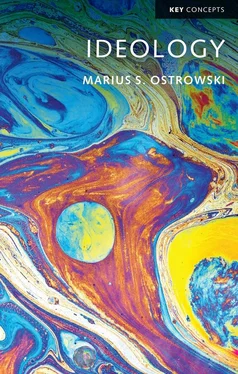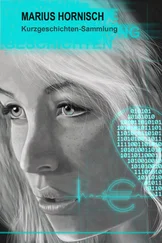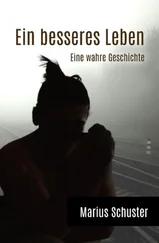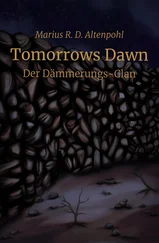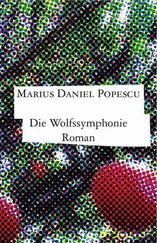At the same time, in its original historical form, ‘ideology’ denotes the ‘ study of ideas’, in the same sense as the (often scientific) acquisition of knowledge associated with constructs such as ‘biology’, ‘criminology’, or ‘sociology’. Paring the concept down to its semantic roots reveals the rich penumbra of allusive meaning that surrounds it. The ‘ideo-’ morpheme stems from the ancient Greek word ἰδέα : a form or shape, a kind or class of ‘element’ with a certain inherent nature or quality, a particular outward semblance or appearance, expressing a clear archetypical style, mode, or fashion, all encapsulated in terms such as ‘principle’, ‘notion’, and ultimately ‘idea’. In turn, ἰδέα connotes εἶδος , which shares the meanings of ‘form’, ‘kind’, ‘quality’, and ‘appearance’ but expands on them to incorporate physical figural ‘looks’, a typical habit, exemplifying or constitutive pattern, state or situation, policy or plan of action, even designated province or department of referential meaning, thus covering the gamut from ‘core essence’ to ‘visible likeness’. Meanwhile, the ‘logy’ suffix derives from the notoriously multifarious word λόγος : fundamentally, it refers to a word or utterance and the process of thought or reflection; yet these meanings are both stretched to cover wider language and spoken expression, phrases and even full sentences, argumentative reasoning, deliberation, and explanation, which together shape debate, discussion, and dialogue. In turn, these inform a vast range of further meanings, from computational reckoning and measurement to reputation, value, and esteem; relations of correspondence to regulative laws; statements of case and cause to formulated hypotheses; mentions of rumour and hearsay to narrative histories or legendary tales; proverbial maxims, proposed resolutions, assertive commands, eloquent literature, and all other senses of purposive discourse. Perhaps the most accurate way to distil these all into a single definition is to describe ‘ideology’ as literally an ‘account’ or ‘telling’ (i.e., both enumeration and narration) of ideas. Through metonymy, ‘ideology’ has shifted from referring to a field of study to naming the object of study itself, as with ‘geology’, ‘pathology’, or ‘technology’; but the sense of a deliberate, meaningful arrangement of ideas has remained.
These two alternative ways of parsing the concept of ‘ideology’ speak to rival understandings of the role that ideas and their patterned groupings play in society (Boudon 1989, 23; Geuss 1981, 4–25; Thompson 1990, 5–7). The first casts ideology in a pejorative or negative light: as a source or instrument of dissimulation and manipulation, which fosters equally fictitious unity and disunity among us where neither need exist. The second understanding adopts a non-pejorative if not strictly positive view of ideology: as a way to understand and describe the nature and meaning of the world around us. While there is scope for overlap and compatibility between their claims about ‘what ideology is and does’, these two understandings have engaged in a long-running struggle for epistemic primacy. Over the two centuries that have elapsed since the term ‘ideology’ entered the lexicon of social research, their relative balance has continually oscillated, propelled by many crucial developments and ‘watershed’ events that punctuated society’s historical trajectory. Mass enfranchisement, economic collapse, total war and genocide, colonialism and decolonisation, religious revival, and the proliferation of countercultures all left their mark on our conceptions of ideology, tying it to an ever-expanding range of views covering everything from personal identity and behaviour to models of social order. Meanwhile, the analytical study of ideology and ideologies (‘ideologology’!) has at various times fostered, resisted, aligned with, and cross-cut these trends. Some approaches have understood their essential task as being to expose and undo the damage ideology causes, from the first Marxists and later the first critical theorists to ‘end of ideology’ and ‘end of history’ approaches. Others favour the more equivocal role of seeking to accurately determine ideology’s ‘laws of motion’, from the original idéologues and subsequently the first political scientists to the social theorists, intellectual historians, and social psychologists working on ideology today.
§1 The central questions in the study of ideology
Despite often strongly divergent inclinations towards pejorative or non-pejorative understandings of ideology, the various approaches to ideology analysis consistently feature a core roster of essential debates, which can be framed as a series of contrasting pairs. The most fundamental of these concerns whether ideology is true or false . This debate hinges on whether ideologies as integrated bodies and ‘tellings’ of ideas correspond closely and demonstrably with reality, or whether they act as ‘alternative realities’ that obscure, deflect from, or contrast with reality ‘as it actually is’. On the former side, ideology is presented as a set of claims about reality, either as it is or as it should be. Ideologies and their constituent ideas are themselves real, acting as generalised ‘placeholders’ for everything from personal mindsets to societal institutions; they are also true in that we ‘hold’ ideas, which influence us into actions and reactions that are likewise real. Moreover, since our encounters with reality in our social existence and actions are always ultimately through (our own and others’) subjective experiences, to all intents and purposes the reality ‘that matters’ is our ideological construction of it, so that ideology is ‘true as far as we are concerned’. Meanwhile, the latter side instead sees ideology as an attempt to portray reality as something other than it is: a ‘mask’ placed over the actual facts, a misdescription of ‘how things really work’ or ‘why things really are the way they are’, a superficial explication and justification that (often deliberately) does not capture the deep societal forces at play. It distracts from other, more important motive influences on our existence and behaviour, such as our interests, drives, or contextual incentives. Above all, ideology creates and maintains a tension between our perception and our experience of society, since there is still a reality ‘out there’ beyond our capacity to ‘name’ it.
A closely related question is whether ideology is a necessary or unnecessary factor in our engagement with reality. The core consideration here is whether all humans rely unavoidably on (in)formal ideological frameworks of meaning, knowledge, and value to understand the world and their place within it, or whether some at least can – and should – transcend ideologies’ convenient, insufficiently considered hermeneutic and epistemic ‘shortcuts’ to reach a ‘higher’, clearer, and direct form of understanding. One approach argues that our ‘access’ to reality is only possible via some form of ideology – even if it does not call itself by that name – in the sense that some ‘account’ of ideas is required to make any claims about reality at all. Ineradicable societal division and disagreement over how to engage with reality engenders several viable alternative ways of ‘telling’ ideas and manifesting them in society (via factions, movements, parties, etc.), laying the foundations for ideological disputes. Moreover, since reality is itself inherently changeable and indeterminate, ideas and their meanings can always be challenged and revised. By contrast, the opposing line is that it is both possible and highly desirable to attain a stance towards reality that lies ‘outside’ or ‘beyond’ ideology, typically through applying scientific and critical methods of enquiry. It finds that all divisions can be bridged or overcome, and that compatibilising different ‘tellings’ provides permanent resolutions to ideological disputes, leading in effect to ideology’s elimination. Similarly, it is possible to ‘settle’ how ideas should be ‘recounted’ and integrated, and a healthy dose of logical reasoning and empirical testing can mostly remove reality from ideology’s ‘reach’.
Читать дальше
